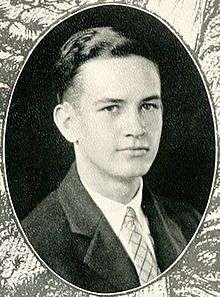Frank G. Slaughter

Frank Gill Slaughter (February 25, 1908 – May 17, 2001), pen-name Frank G. Slaughter, pseudonym C.V. Terry, was an American novelist and physician whose books sold more than 60 million copies. His novels drew on his own experience as a doctor and his interest in history and the Bible. Through his novels, he often introduced readers to new findings in medical research and new medical technologies.
Biography
Slaughter was born in Washington, D.C., the son of Stephen Lucious Slaughter and Sarah "Sallie" Nicholson Gill. When he was about five years old, his family moved to a farm near Berea, North Carolina, which is west of Oxford, North Carolina. He earned a bachelor's degree from Trinity College (now Duke University) at 17 and went to medical school at Johns Hopkins University in Baltimore, Maryland. He began writing fiction in 1935 while a physician at Riverside Hospital in Jacksonville, Florida, paying off a $60 typewriter at $5 a month. He rewrote the manuscript of That None Should Die, a semi-autobiographical story of a young doctor, six times before Doubleday accepted it.
Several of Slaughter's novels became films, including Sangaree, made into the 1953 film of that name starring Fernando Lamas; and Doctors' Wives, made into the 1971 film of the same name starring Dyan Cannon and Gene Hackman.
Other books by Slaughter include The Purple Quest, Surgeon, U.S.A., Tomorrow's Miracle and The Scarlet Cord. Slaughter's last novel, Transplant, was published in 1987. Slaughter died May 17, 2001 in Jacksonville, Florida.
William DuBois was a silent writer with Slaughter on 27 of Slaughter's historical novels.[1]
Books
Fiction
- That None Should Die (1941)
- Spencer Brade M.D. (1942)
- Air Surgeon (1945)
- A Touch of Glory (1945)
- In a Dark Garden (1946)
- The Golden Isle (1947)
- Sangaree (1948)
- The Divine Mistress (1949)
- The Stubborn Heart (1950)
- Fort Everglades (1951)
- The Road to Bithynia (1951)
- East Side General (1952)
- The Cross and The Crown (1953)
- Storm Haven (1953)
- The Galileans: The story of Mary Magdalene (1953)
- The Song of Ruth (1954)
- The Healer (1955)
- Flight From Natchez (1955)
- The Scarlet Cord: A novel of the woman of Jericho (1956)
- The Warrior (1956)
- Sword and Scalpel (1957)
- The Mapmaker (1957)
- Daybreak (1958)
- The Crown and the Cross: The Life of Christ (1959)
- Lorena (1959)
- The Thorn Of Arimathea (1960)
- The Land and the Promise: The Greatest Stories of the Bible Retold (1960)
- Pilgrims in Paradise (1960)
- The Curse of Jezebel (1961)
- Epidemic! (1961)
- David, Warrior and King (1962)
- Tomorrow's Miracle (1962)
- Devil's Harvest (1963)
- Constantine, The Miracle of the Flaming Cross (1965)
- The Purple Quest (1965)
- Doctors' Wives (1967)
- God's Warrior (1967)
- The Sins of Herod (1968)
- Upon this Rock (1968)
- Surgeon's Choice: A Novel of Medicine Tomorrow (1969)
- Countdown (1970)
- Convention M.D. (1972)
- Women in White (1974)
- Devil's Gamble: A Novel of Demonology (1977)
- Plague Ship (1977)
- Gospel Fever (1980)
- Doctors at Risk (1983)
- No Greater Love (1985)
- Transplant (1987)
As C. V. Terry
- Buccaneer Surgeon (1954)
- Darien Venture (1955)
- Buccaneer Doctor (1955)
- The Golden Ones (1957)
- The Deadly Lady of Madagascar (1959)
Nonfiction
- Immortal Magyar: Semmelweis, the Conqueror of Childbed Fever (1950)
- The New Science of Surgery (1946)
- Medicine for Moderns: The New Science of Psychosomatic Medicine (1947)
References
- ↑ "Paid Notice: Deaths DUBOIS, WILLIAM", New York Times, March 19, 1997
- Petri Liukkonen. "Frank G. Slaughter". Books and Writers (kirjasto.sci.fi). Archived from the original on 4 July 2013.
- "Frank G. Slaughter, novelist and physician, dead", Associated Press, May 23, 2001.
- "Frank Slaughter, Novelist Of Medicine, Is Dead at 93", Paul Lewis, New York Times, May 23, 2001.
- Kevin M. McCarthy: The Book Lover's Guide to Florida: Authors, Books and Literary Sites. Pineapple Press Inc. 1992, p. 43-45, ISBN 1-56164-021-2
External links
|